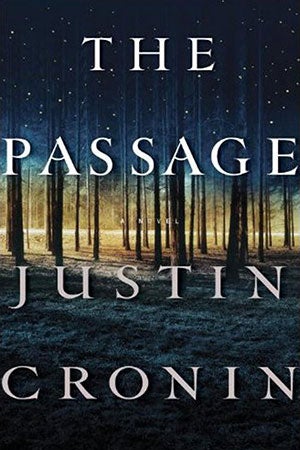The Passage: Discussion Questions
Discussion Questions
2. Does the military make the right choice in undertaking Noah? When so much of society is under constant threat of violence, is there a moral imperative to do whatever is scientifically possible to save the country from collapse?
3. Why does the military choose the name Project Noah? Talk about the irony behind the name—especially its Biblical reference to the destruction of a flawed race.
4. How far should society let science proceed in its research to alter biology? At what point do we say “no” to the human desire for ever greater knowledge?
5. Inmates on death row are offered a life sentence if they agree to participate in the government’s experimental drug program. Is it moral to enroll murderers and rapists in medical research studies?
6. The Passage contains different types of writing, including diary entries, emails, maps, news articles, and academic papers. Why would the author use this technique to tell his story? How do faux documents contribute to the reading experience of the novel?
7. Discuss any or all of the characters in the first part of the book: Amy Bellefonte, Sister Lacey, Brad Wogast, and Carter, or any others. What are they like as individuals? Whom do you find most sympathetic?
8. Did you find it difficult to adjust to the end of Part I and the beginning of Part II? Did you enjoy the second part as much as the first? Some readers said it feels as if they are two separate novels. Others felt they blended well. What do you think?
9. Talk about the way in which the survivors of the colony understand the past—their own history and that of the world that has been lost.
10. What do you think of Peter Jaxson? Is he a satisfactory or disappointing hero? What about the other members of the colony?
11. What does the expression “all eyes” mean?
12. Amy wanders for years alone, and having no use for speech she loses the ability to talk. Can you imagine yourself in Amy’s situation, unable to utter the most basic means of communication that all of us take for granted?
13. Members of the colony sometimes question the desire to continue in what appears to be a hopeless situation? What good is perseverance if it ends in futility? They also ask questions pertaining to God and destiny. What are your thoughts on these big issues? How would you answer those questions if you were a member of the colony?
14. Why does Cronin take readers inside the minds of the virals? Talk about the mental emotional processes they undergo—telepathy, memory or connections to one another. How are they like humans…and how do they differ?
15. What about the ending? Is it satisfying, with loose strings tied up? Or does it feel manipulative, purposely left open to make room for the sequel?
Praise
Named one of the ten best novels of the year by Time magazine and one of the best books of the year by The Washington Post, Esquire,U.S. News & World Report, NPR’s On Point, St. Louis Post-Dispatch, Booklist, and Library Journal
“Magnificent.”—Time
“Magnificently unnerving . . . The Stand meets The Road.”—Entertainment Weekly
“Great entertainment . . . [a] big, engrossing read.”—The Dallas Morning News
“Mythic storytelling.”—San Francisco Chronicle
“Cronin’s unguessable plot and appealing characters will seize your heart and mind.”—Parade
“Cronin has given us what could be the best book of the summer. Don’t wait to dive into The Passage.”—USA Today
“[A] blockbuster . . . astutely plotted and imaginative.”—The New York Times Book Review
“Justin Cronin has written a wild, headlong, sweeping extravaganza of a novel. The Passage is the literary equivalent of a unicorn: a bona fide thriller that is sharply written, deeply humane, ablaze with big ideas, and absolutely impossible to put down.” —Jennifer Egan, author of A Visit from the Goon Squad
“Cronin gets it just right; the combination of attentive realism and doomsday stakes makes for a mesmerizing experience.”—Salon
“We’ve just found our summer escape!”—Elle
“Read this book and the ordinary world disappears.”—Stephen King, author of Full Dark, No Stars
“Great storytelling . . . vital, tender, and compelling.” —O: The Oprah Magazine
“Meet what is likely to be one of the biggest blockbusters of the summer.”—People
“Addictive, terrifying, and deeply satisfying. Not only is this one of the year’s best thrillers; it’s one of the best of the past decade—maybe one of the best ever.”—Men’s Journal

